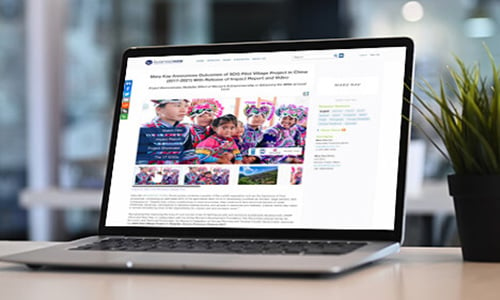News and the power of media transcend borders, enabling organizations to reach audiences around the globe. However, successfully connecting with reporters in different regions requires finesse, cultural awareness, and a tailored approach. Whether you're an entrepreneur, a public relations professional, or an aspiring influencer, understanding the nuances of global media pitching can significantly enhance your chances of securing valuable coverage. Business Wire’s Global Media Relations team shares best practices for pitching journalists all over the world.
Europe
Simona Colletta, Paris Media Relations Specialist
Andrea Ballesteros, Frankfurt Media Relations Specialist
- When pitching in Europe, it is important to speak the language of the journalist you are contacting. Having a multilingual team is key for successful European media outreach, or having pitches translated by native speakers.
- The General Data Protection Regulation (GDPR) is a vital rule to follow. Always ask permission and wait for a written answer before you add a journalist to a media list. Several countries in Europe are evaluating the legality of AI technology in relation to GDPR compliance. As this continues to develop, be sure to remain mindful of GDPR regulations.
- Focus on the specialization of each journalist you pitch, so you can propose the most relevant stories.
- When pitching in Germany it is important to be very formal. German media usually don’t like informal language. You must be very professional and straight to the point, avoid small talk, and always be on time for meetings or interviews. Pitches should be very well-formatted and answer any questions that may be asked.
- Sending German media information that they are not familiar with before calling most likely will lead to them not being responsive.
United Kingdom
Catriona Gilmour, London Media Relations Specialist
- When pitching journalists in the UK, be mindful of grammar and tone in emails. Exclamation points and greetings like “Hey” can read as over-familiar and unprofessional, so it’s best to use a slightly more formal greeting like “Hello” or “Dear”.
- Journalists receive hundreds of PR-related emails per day. Less is more. Keep email pitches to a concise four or five sentences. British people tend to value brevity in communication, so try to keep your emails short and to the point. Avoid rambling or including irrelevant information.
- Be respectful of time zones, evenings, weekends, and holidays. It is not common practice to answer emails during off hours in the UK, so always allow reasonable timeframes for replies.
- GDPR is retained in domestic law post-Brexit but the UK has the independence to keep the framework under review. It’s important to gain consent before adding journalists’ names and email addresses to mailing lists in order to comply with the legislation, as you would for any other European contacts.
Asia-Pacific
Ai Arakawa, Asia-Pacific Media Relations Manager
Ronald Chung, Hong Kong Senior Media Relations Specialist
- In Mainland China, most communication with media is via WeChat, while WhatsApp is used in Hong Kong and some other countries like Indonesia. In Taiwan and Japan, LINE is frequently used for media outreach, especially for follow-ups. Install and use the messaging app that is locally used per country. This research by SimilarWeb will help you understand more about this topic.
- In Japan, Yahoo! Japan News is considered "the king” of online news, according to the Reuters Institute for the Study of Journalism. They partner with many online news outlets including trades, and it is crucial to establish strong relationships with industry trade media outlets.
- When pitching to Australian media, be extremely straight to the point, and use short sentences. They are outgoing and friendly but prefer direct, clear communication.
- India is a country with hundreds of languages spoken and 22 major languages recognized by the Indian constitution. English is widely spoken in India, but try to reach out in the local language of your targeted region. Like other media, while Indian media outlets are very open to hearing your pitch, they may not cover your story. Share your news with long-term relationship building in mind.
- Southeast Asia has diverse media landscapes with varying regulatory frameworks, ownership structures, and preferences. Therefore, it is important for you to establish good relationships with national press agencies and media outlets.
- Since management and editorial contacts are rarely shared on online public pages, face-to-face meetings and phone appointments with media and editorial teams are required.
- Overall, it is crucial to engage with the local media and potential stakeholders in their native language to showcase your sincerity and enthusiasm. This approach is vital, as journalists are often busy and may prioritize news tips in their own language rather than investing time in understanding English. That's why our Asia-Pacific circuits include translations.
Latin America
Andrea Ballesteros, Frankfurt Media Relations Specialist/Latin America Media Representative
- In Latin America, the media is more comfortable with and prefers informal language with a more personal approach. Be easygoing and make them feel heard and comforted -- almost as if you are their friend instead of a business partner.
- You must be very patient when it comes to finalizing a deal. Most of the time there are many people involved in one decision, so don’t give up just because they take their time.
- One of the main channels of communication in Latin America is WhatsApp. Be prepared to be asked for your WhatsApp number, and expect to be contacted outside business hours. It’s expected that you respond almost immediately, even if it’s not with a final answer. This gives the impression of acknowledgment and builds trust in the partnership.
United States
Jeanne Prisyazhnaya, New York Media Relations Specialist
- Don’t DM a reporter. Personal social media accounts are personal for a reason. Pitching via Instagram, DM-ing, and FaceTiming is almost never recommended.
- To call or not to call? According to Muck Rack’s State of PR 2023 survey, the vast majority (89%) of journalists prefer to connect with PR professionals via a 1:1 email while 15% preferred a phone call. However, if it is a time-sensitive story, a phone call may be best.
- Nurture and maintain relationships with reporters. Today’s intern at a local blog is tomorrow’s Editor-in-Chief at The New York Times. The media world is much smaller than it seems, and word of mouth is powerful, so making an effort and building long-lasting relationships based on trust, respect, and truth will be fruitful for many professional years to come.
- The California Privacy Rights Act (CPRA) is a vital rule to follow in California and for any media company that conducts business in California. Similar to GDPR, the key is to always ask permission and wait for a written answer before you add a journalist to a media list.
US Hispanic/LatinX
Pilar Portela, US Media Relations Manager/LatinoWire Media Representative
- When pitching the US Hispanic/LatinX community, it is important to reach out in the language of the journalist you are contacting. If the media outlet is a Spanish language publication your outreach should be in Spanish. The stories you are sharing should also be in Spanish.
- Translating your message isn’t enough. Google Translate or Alexa isn’t sufficient. A literal translation will only lead to poor syntax, missing special characters, and even unintended double meanings. You can have the best of intentions, but one mistake can lead to accidentally insulting someone who speaks the language fluently, costing you a lot of money, and damaging your brand’s reputation. Use a professional service or a trusted native speaker at your organization.
- In addition to pitching well-written Spanish stories, connecting with Hispanic media relies heavily on nurturing and maintaining personal relationships. When you pitch in Spanish, you must learn how to navigate the language’s distinctions of formality and politeness. Many believe that Spanish-speaking skills are enough – but they are not.
- Keep in mind that not all LatinX communities are the same. When reaching out to the Hispanic market, your media efforts should be localized since each community is culturally different. A suggestion is to either partner with a multicultural agency tailored to niche Spanish markets or hire diversely within your in-house communications team.
Middle East
Matthew Allinson, Director of Global Media Relations
- Media outlets across the Middle East tend to publish news related to the region, so it’s best if you can highlight a relation (if any) to the Middle East, a country in the region, or the name of a company based there in the headline of your news release.
- Don’t send a news release or make a pitch on Sunday (the first day of the work week in the Middle East). Timing plays a big role if you are targeting print media. Any news release distributed after 4:00 PM (at the latest) local time (8:00 AM ET) has less of a chance of being picked up by the print media.
- If you have the chance to meet a journalist or publisher in person, there is a tradition of drinking Arabic coffee, and it can be considered an offense if the visitor doesn’t drink it as it is part of Arab hospitality. Also, professional classic and conservative attire is advisable.
Canada
Matthew Allinson, Director of Global Media Relations
- Canadian journalists are some of the friendliest journalists in the world, but their demeanor can change quickly if you don’t take the time to read and understand what a particular journalist is writing about before making your pitch. Like most journalists, Canadian journalists are inundated with pitches throughout their day, so yours should be friendly, well-researched, and topical for the industry or geography they cover.
- Canada’s Anti-Spam Legislation (CASL) has been described as some of the toughest anti-spam legislation in the world and is worth being aware of. Penalties for violating the law are steep. The legislation, for example, requires any message sent through a digital medium to have a clear opt-out option. It also requires consent from the receiver for any “commercial electronic message.” There are exceptions and implied consent can be considered when a company provides contact names and email addresses on their websites, which most media companies do. That said, automated/scheduled pitching is a risky proposition and should be avoided.
Successful engagement with reporters around the globe requires a deep understanding of cultural nuances, language preferences, and regional media landscapes. Whether you're targeting Europe, the United Kingdom, Asia-Pacific, Latin America, the United States, US Hispanic/LatinX communities, the Middle East, or Canada, each region presents its own unique challenges and opportunities. Taking the time to customize your approach is essential to build meaningful relationships with journalists and improves your chances of securing media coverage.
Learn more
Additional Insights and Advice from Media Professionals
Tips for Pitching Internationally from AFP and FPA
Discover Business Wire’s Media & Journalist Tools
Global Press Release Distribution with Business Wire
Learn more about Business Wire's Distribution Lists
Get the latest PR, IR, Marketing and Media tips on the Business Wire Blog. Subscribe today!




